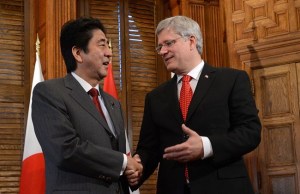
Based on the foregoing, it is understandable why Japan’s foreign policy has been fluctuating in relation to Russia.
The latest news about the accident at the Fukushima Nuclear Power Plant-1 seems to put an end to the Japan’s nuclear program, made to American designs. The situation at the Fukushima-1 is very difficult, and few promising prospects are visible. Soon, 30% of Japan’s electricity generators have to be transferred to alternative energy resources – gas or coal. The latter is not very good for the environment. Japan is a small country. Hiroshima and Fukushima have already caused great damage to its inhabitants. Coal will not make this environment cleaner.
A good alternative to nuclear energy is natural gas. This is clearly understood in Tokyo. The best way out of the situation is the improvement of relations with Russia and participation in the development of oil and gas fields in the Russian Far East. Hence, this is the policy of Japanese “moderates”, who support the expansion of cooperation with the Russian Federation. Not so long ago, it seemed that Russia and Japan finally agreed to settle their territorial issues and begin an economic dialogue. Shinzo Abe’s policy threw the negotiation process back to the starting point. The current Japanese prime minister puts territorial claims against Russia over the benefits of economic cooperation.
That is how intransigent Shinzo Abe is.
Some observers have called the Japanese Prime Minister the “national-oriented right conservative. In reality, this is not true. His economic methods, in general, have the right-liberal nature and relate primarily to the money-and-credit policy. Such politicians are well known in the world. Their governing was characterized by high inflation and falling living standards.
As for any “national” interests, what does Abe understand by these? The dispute over the Russian South Kuril Islands could last another two hundred years, without great prospects of ever getting them at all. The problem of the nation’s energy supply is extremely important for Japan. It is much more important than some small islands, formerly inhabited by the Ainu.
Abe’s policy is not nationally oriented. His policy is rather focused on Washington, which sees Japan as a naval base and the runway for its aircraft. The White House threatens Tokyo and hisses through its teeth: “Do not be friends with the nasty Russians, they will teach you to drink vodka and play the balalaika.”
The problem is as follows. From whom should Japan buy natural gas, if to make friends with Gazprom is reprehensible to this “nationally oriented” policy? Is it possible to somehow separate flies from the cutlets, radiation from Fuji and the gas from the islands? Washington believes that it is impossible, and proposes buying shale gas from Canada and the United States.
It seems that the United States is the largest producer and distributor of Trojan horses for the needs of East Asia. First, they dropped two atomic bombs on Japan. Then, the nuclear power plant Fukushima-1 was built, according to American designs. Later it was washed away. Now the United States and Canada intend to supply shale gas to Japan. Yes, everything is done just that way. Land of the Rising Sun has lost the war, and now will be paying until U.S. military aircraft rust away.
What is this talk really about?
Shale gas began to be extracted in the U.S. in 1921. Then it was replaced by natural gas. Why? Because the cost of natural gas production was lower, and its reserves were huge. With the world energy prices rising (more precisely with the fall of the purchasing power of the U.S. dollar), shale gas has now become a cost-effective, although the margin is small.
Academician Anatoly Demetrius, Director of the Oil and Gas Institute, notes that in the United States, the cost of production of shale gas is at least $150 per thousand cubic meters. This is despite the fact that in America the gas-bearing strata lie relatively shallow. According to East European Gas Analysis, the average cost of gas for Gazprom in the 1st quarter of 2012 amounted to 920 rubles/cubic meter ($30.43).
Yes, Gazprom is a renowned exporter, which aims at getting the most benefit out of its position. The United States and Japan are not run by communists (yet), but by disinterested capitalists. Everyone wants to buy cheaper and sell more expensively. This is the free market, the market of eternal values and the other things of this kind.
Deliveries of shale gas from the U.S. and Canada represent, if not the next Panama, then at least a very questionable transaction. The Land of the Rising Sun will have to pay for all these.
Konstantin Penzev, writer, historian and columnist, exclusively for the online magazine “New Eastern Outlook”.
